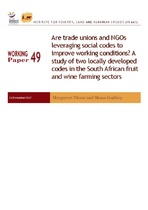| dc.contributor.author | Visser, Magareet | |
| dc.contributor.author | Godfrey, Shane | |
| dc.date.accessioned | 2019-03-14T12:49:13Z | |
| dc.date.available | 2019-03-14T12:49:13Z | |
| dc.date.issued | 2017-11 | |
| dc.identifier.citation | Visser, M., Godfrey, S. (2017) 'Are trade unions and NGOs leveraging social codes to improve working conditions? A study of two locally developed codes in the South African fruit and wine farming sectors ’, Working Paper 49. PLAAS, UWC: Cape Town. | en_US |
| dc.identifier.uri | http://hdl.handle.net/10566/4531 | |
| dc.description.abstract | The paper explores one aspect of the food security question, namely the livelihoods of
farmworkers, which ultimately speaks to the sustainability of farms and the provision of food. It
focuses on the emergence of locally made private social codes (Wine and Agricultural Ethical
Trade Association – WIETA, and Sustainability Initiative of South Africa – SIZA) in the Western
Cape fruit and wine sectors and how compliance with such codes has increasingly become a
requirement to export to certain markets (being an aspect of vertical governance in the fruit and
wine value chains). Many standards in private social codes duplicate rights in national
legislation, but some standards improve on statutory rights and certain enabling standards that
offer leveraging opportunities to worker organisations to further improve wages and working
conditions. Such leveraging constitutes a form of horizontal governance of the fruit and wine
value chains.
The paper analyses key sections of the two locally made social codes against the Fairtrade code
and Sectoral Determination 13 (SD13). The analysis indicates where the codes improve on SD13
and how they compare to the Fairtrade code, which is generally seen to offer the best enabling
standards for workers. The paper then presents the results of empirical research on the extent
to which worker organisations – that is, trade unions and labour-oriented non-governmental
organisations (NGOs) – have leveraged relevant standards to effect improvements for workers.
The role of the state in facilitating such leveraging is also explored.
The paper finds that, in general, worker organisations have little knowledge of the WIETA and
SIZA codes and hardly any attempts have been made to leverage the codes. The only
contestation of the codes that had a significant impact was from an actor outside the sector and
country, namely the documentary film-maker who produced Bitter Grapes. The paper questions
why worker organisations have made so little of the codes. The low capacity of such
organisations is one explanation, but these organisations are also disenchanted with the codes
because WIETA’s and SIZA’s sanctioning of non-compliance has been insufficient. | en_US |
| dc.language.iso | en | en_US |
| dc.publisher | Institute for Poverty, Land and Agrarian Studies, University of the Western Cape | en_US |
| dc.relation.ispartofseries | Working Paper;49 | |
| dc.subject | Food security | en_US |
| dc.subject | Livelihoods | en_US |
| dc.subject | Farm workers | en_US |
| dc.subject | Trade unions | en_US |
| dc.subject | Fruit farming sector | en_US |
| dc.title | Are trade unions and NGOs leveraging social codes to improve working conditions? A study of two locally developed codes in the South African fruit and wine farming sectors | en_US |

